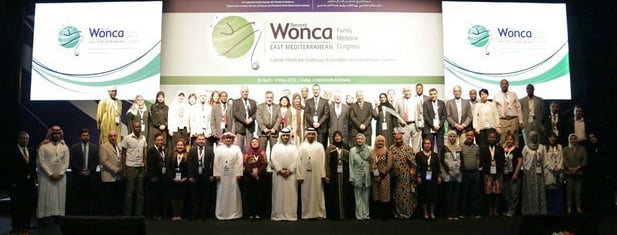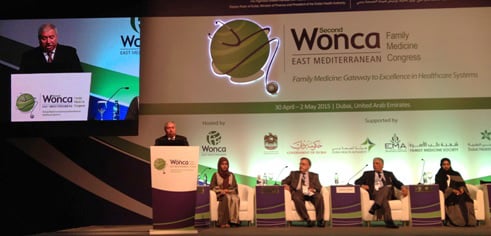From the President
Family Medicine in the East Mediterranean Region
 The closing ceremony of the recent WONCA East Mediterranean Regional Conference held in Dubai
español
The closing ceremony of the recent WONCA East Mediterranean Regional Conference held in Dubai
español
The WONCA East Mediterranean Region is WONCA’s newest region, but family medicine has been in this region for a very long time, as we have seen from the writings of Ancient Egypt. WONCA’s East Mediterranean region extends from Morocco in the west, to Afghanistan in the east, and includes over 20 countries. WONCA’s East Mediterranean Region recently held its 2015 regional conference in Dubai in the United Arab Emirates.
 Photo: WONCA East Mediterranean region president Dr Mohammed Ibrahim Tarawneh (Jordan), addresses delegates at the recent regional conference.
Photo: WONCA East Mediterranean region president Dr Mohammed Ibrahim Tarawneh (Jordan), addresses delegates at the recent regional conference.
WONCA works closely on health system strengthening with the World Health Organization (WHO), both at a global level, and in each of the regions of the world. The Eastern Mediterranean Regional Organization of the WHO, called EMRO, led by Regional Director, Dr Ala Alwan, has a very special focus on the contributions family medicine can make to universal health coverage in each of the nations of the WHO’s Eastern Mediterranean Region. Indeed Dr Alwan and the WHO EMRO is leading the world in this focus on strengthening health services through family practice.
At a recent WHO meeting held in Cairo, Dr Alwan, reminded delegates from the 22 nations of the region that “Universal health coverage needs to focus on the provision of quality health services to all people” and that “Family practice is one of the principle service provision aspects of universal health coverage … offering person-centred integrated health services.”
The WHO has been working with our WONCA member organisations to identify the current status of family practice in the 22 countries of the EMRO region. Professor Waris Qidwai from Pakistan has led a review by WHO EMRO on the status of family medicine training programs in the nations of the region. WONCA is now supporting a new initiative of the WHO to assist the roll out of new family medicine education and training program developments in countries including Morocco, Sudan and Tunisia.
In February the World Health Organization regional office for the Eastern Mediterranean Region released its new report on
Strengthening service provision through a family practice approach: towards universal health coverage in the Eastern Mediterranean Region. This is a landmark document from a WHO region, with lessons for all nations, and I commend it to you.
WONCA is committed to working with our WHO colleagues on continuing to strengthen health service provision in each of the nations of the Eastern Mediterranean Region through a family practice approach. This is essential if we are to achieve universal health coverage for the people of this region. This region is unique with its range of low, middle and high income countries, and countries in crisis. The lessons learned during implementation of these reforms in this region will inform developments in many other nations, especially low income nations, in other regions of the world.
WONCA’s recognizes the importance of supporting the next generation of family doctors. Over the past 18 months we have seen young family doctor movements established in all seven regions of the world. In th

e EMR region young family doctors can become involved with WONCA through the Al Razi Movement, established by young family doctors in this region in 2013, and led by Dr Nagwa Nashat Hegazy from Egypt. The Al Razi Movement is named after the great physician and teacher from Persia who is credited with several medical "firsts", most notably describing for the first time the clinical distinction between smallpox and measles.
Photo: The President of WONCA learns to use a 'selfie stick', thanks to young doctors at the conference.
A particular challenge for some of the nations in this region of the world is rebuilding their health services following emergency situations. This includes natural disasters such as earthquakes like the recent tragedy that affected our friends and colleagues in Nepal, and the Ebola crisis which has had a devastating effect on the populations and the health services in the affected nations of West Africa. Emergency situations can also be due to armed conflicts and civil unrest as we have seen unfolding in some of the nations of the EMR region, including Iraq and Syria and Libya and Afghanistan. Regardless of the cause of emergency situations, a cascade of human suffering is often the result including large scale displacement with refugees moving across borders, shortages of food and clean water and sanitation, disease outbreaks and human rights abuses. The WHO has been working to address the mental health consequences of emergency situations and has produced an excellent report on Building Back Better Sustainable Mental Health Care after Emergencies. It documents work underway to support rebuilding of more sustainable mental health services in countries and areas like Afghanistan, Iraq, Jordan, Somalia and the West Bank and Gaza Strip.
WONCA works closely with the WHO on the integration of mental health into primary care services. We need to re-energise this commitment and work together to ensure that the entire primary health care systems in these nations are strengthened after conflict and catastrophe. It is only through strong primary care that each of our nations will have the resilience to withstand future crises and be able to support our people at their times of greatest need.
Michael Kidd,
President, World Organization of Family Doctors (WONCA)